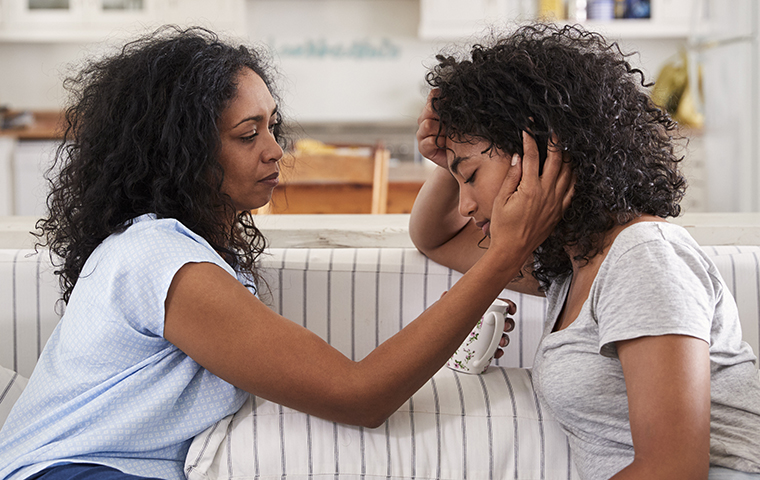Parenting a Child with Anxiety
By Onyi Azih
Read time: 7 minutes
My husband and I have been married for seven years, and together we've raised two brilliant little boys - a five-year-old and a three-year-old. They're a big reason why I not only focus on my physical health but also my mental health. Over the years, I've tried to be very open when it comes to sharing my parenting and mental wellness journey. I do this with the hope of being a source of inspiration for anyone going through the same struggles I did.
Growing up as the daughter of Nigerian immigrants had a big impact on my life. My experiences were positive, and they often serve as reminder of how important it is to strive for success. There are, however, some parts of this drive to succeed that led to overwhelming feelings of stress and chronic anxiety for me.
Being the oldest of five children meant that there were a lot of expectations set for me, including my behavior and my academic success. Ever since I've been very young my parents discussed our education and helped guide our plans for our future. We talked about a lot, but one topic that didn't come up was childhood anxiety. As a child who chose to silently suffer with anxiety, it's something I never really learned how to manage. I carried this anxiety into adulthood.
As the years passed and I became a parent, I continued to struggle with even bigger anxieties. I noticed that it was no longer just affecting me but how I engaged my family. My constant questions and worrying were affecting my kids. That's when I knew I needed to make a change. It took many years for me to change the way I cared for myself and my mental health, but I wanted to improve for myself and set a good example for my young family. I also wanted to learn how to recognize and help my kids deal with their anxieties. Now I'm a psychiatric physician's assistant and discuss mental health frequently both professionally and as a parent.
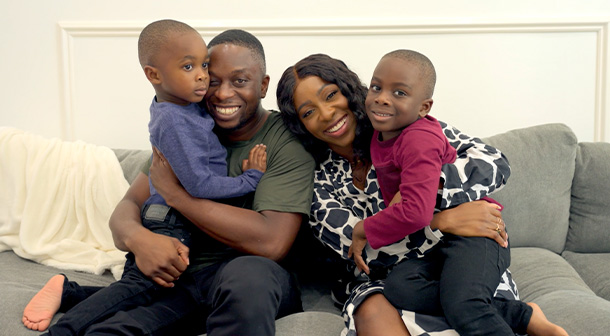
Dealing with my anxiety and getting help
There was a time when my anxiety was really beginning to interfere with my life. At the time, I had launched my first blog and moved across the country for my physician assistant program. I was experiencing chronic anxiety due to the mounting pressure from school. It didn't help that I was so far away from the friends and family who had been the support system I had relied on for so many years.
I was also dealing with postpartum anxiety and was in search of a community to support me as I dealt with feelings of mom guilt. I spent countless hours searching websites and forums for new moms who could relate to my experience. I spent more time blogging and found that while it was therapeutic for me, it did not directly address my anxiety. It wasn't until years later when I started seeing a therapist that I was able to learn the root causes of my mental health struggles and take action to address them. Seeking therapy was one of the best decisions I could have made, and I recommend the same to anyone who wants to improve their mental health wellness.
Take time for yourself.
Getting professional help was crucial for managing my anxiety, but there were other simple things I learned that could help as well:
- Take up a hobby like reading or yoga, or do something as simple as taking a relaxing bath.
- Create a schedule that works for you and stick to it by using a calendar or other electronic reminders.
- Maintain a healthy diet.
- Be sure to get enough sleep on a regular basis.
- Get moving! Exercise can play a major role in reducing stress.
- Don't hesitate to talk about your concerns. Talk with a friend, your partner, or a counselor or therapist.
- Join online communities to find and learn from parents who may be in a similar situation as you.
- Always remember that you are not alone.
Motherhood and being a mental health provider
As a psychiatric provider, I have treated adult patients with a variety of common mental health disorders. Many of the conditions that my patients are diagnosed with can also happen in children. Oftentimes they include mental emotional disorders that began in their childhood.
As a parent, I try to support my kids' mental health development using a variety of techniques. I have used my own personal experience with anxiety, along with my medical background to make sure that our children get the support and resources they need for their well-being, especially their mental health. I want my kids to understand their feelings and learn how to work through their fears and challenges.
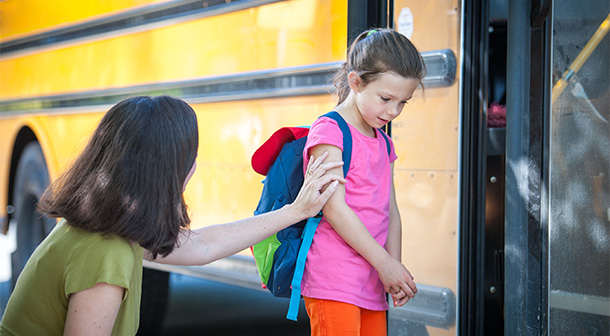
Common mental health disorders in children
You may be wondering about the childhood mental health disorders that you should be aware of, and how they might affect a child's development. Mental health disorders in children are described as changes in the way children behave, learn, and process emotions. These can lead to feelings of distress and challenges in getting through their day. There are also other conditions that may present learning and thinking differences in children, such as autism, as well as language and learning disorders. Some examples of mental health disorders in children include:
Anxiety
A nervous disorder characterized by excessive uneasiness and apprehension, typically with compulsive behavior or panic attacks.
Depression
A mood disorder that causes a persistent feeling of sadness and loss of interest and can interfere with your daily life.
Attention-Deficit/Hyperactivity Disorder (ADHD)
A disorder that impacts the parts of the brain that help us plan, focus on, and execute tasks.
Post-Traumatic Stress Disorder (PTSD)
A mental health disorder that some people develop after they experience or see a traumatic event.
Obsessive Compulsive Disorder (OCD)
A disorder in which people have recurring, unwanted thoughts, ideas, or sensations (obsessions) that make them feel driven to do something repetitively (compulsions).
Tourette Syndrome
A disorder characterized by involuntary tics and vocalizations and often the compulsive utterance of obscenities.
Need parenting help now?
The Texas Parent Helpline is available 24/7.
- Call 833-680-0611
- Chat with us
- Text 833-680-0611
Causes of anxiety in children
Individual stressors vary, but some common risk factors that may cause a child to develop anxiety include:
- Traumatic events that cause a feeling of loss of control.
- Demanding parents.
- Stressful environments and overwhelming schedules.
- Overprotective or over-controlling environments.
- Anxiety in parents that children adopt.
- Genetics and its influence on a child's vulnerability to anxiety.
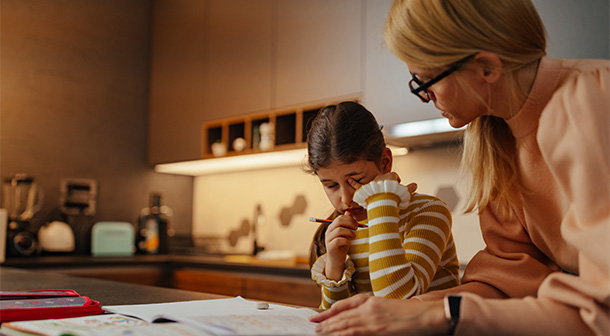
Experiential or situational anxieties
With the start of the new school year, there are so many different reasons for children and their parents to experience an array of emotions. For young children like my boys, school may be a new experience that could bring about some fears. It's important that we're mindful of how we speak of new experiences to our children, as they are likely to pick up on our own anxieties or feelings. A new school year also means an unfamiliar environment, a new routine, and lots of strange faces for our kids. These circumstances can be overwhelming for an adult, so imagine the impact it could have on a child. My husband and I try to encourage our boys to face their fears head-on at the beginning of each school day, while reminding them of our support if they need it.
Signs of childhood anxiety to look out for
Some signs of anxiety in children may include:
- Social anxiety – the fear of social settings.
- Excessive fear or worry.
- Anger and irritability.
- Trouble sleeping.
- Difficulty concentrating.
- Nervous habits like nail biting.
- Stomach aches.
- Tiredness.
- Headaches.

Some anxiety is normal. When it becomes chronic, excessive, and interferes with everyday activities, it's important to take it as a sign to seek help.
Practical tips for parents to support their children
Ask open-ended questions.
When it comes to helping my son deal with his anxiety, I try to teach him steps he can take to cope with it. One way I accomplish this is by avoiding leading questions and sticking to open-ended questions. For example, instead of asking, “Are you anxious about going to school?” I would say, “How do you feel about going to school?”
Help them understand and talk about their feelings.
Sometimes children act out and may need help expressing their feelings. You can encourage them to use healthier ways to express their emotions like:
- Using simple words to explain feelings in a way that a child can understand such as happy, sad, mad.
- Finding teachable moments to guide them on how to resolve their emotions. Walk them through the process.
- Supporting them with reminders of what they can do if they are unable to talk through their feelings - things like taking a few deep breaths or taking a moment for yourself.
- Using books and characters to illustrate feelings.
Other ways you can support your child include:
- Validating their emotions.
- Assuring them that others have anxiety at times, and that their feelings are not strange or out of the ordinary. This is a common feeling, and others often feel the same way.
- Teaching them problem-solving and coping skills such as breathing exercises or a plan of what to do if they experience anxiety or other negative emotions.
- Helping them plan how they are going to manage the situation.
- Being supportive by allowing them to be exposed to certain anxieties. This will help them learn how to calm themselves down, learn how to resolve conflicts, and solve problems.
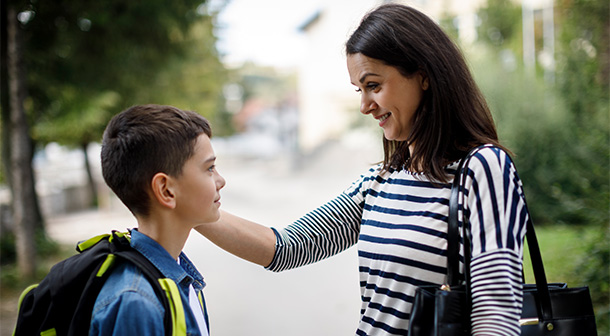
Parents can unintentionally contribute to anxiety by accommodating it. An example of this would be letting your child stay home from school if they are anxious. It's essential that you help them learn how to tolerate and process through fears or uncertainties. Repeated exposure is a proven method to help them learn how to problem-solve and teach them endurance during tough times.
When to seek professional support
You should seek professional support when your child's anxiety frequently interrupts activities of daily living. If it starts to prevent them from doing things they should, then you should consider seeking a licensed professional to help them through this journey.
Resources for parents and their child
Believe me when I say that I understand how overwhelming it can feel as a parent when things don't go as planned. It can be easy to fear for them or blame yourself, but that doesn't benefit you or your child. Help is available for you and your family. And remember: your wellness is just as important as your child's well-being. So be sure to care of yourself so you can be the best you can be for the ones you love.





